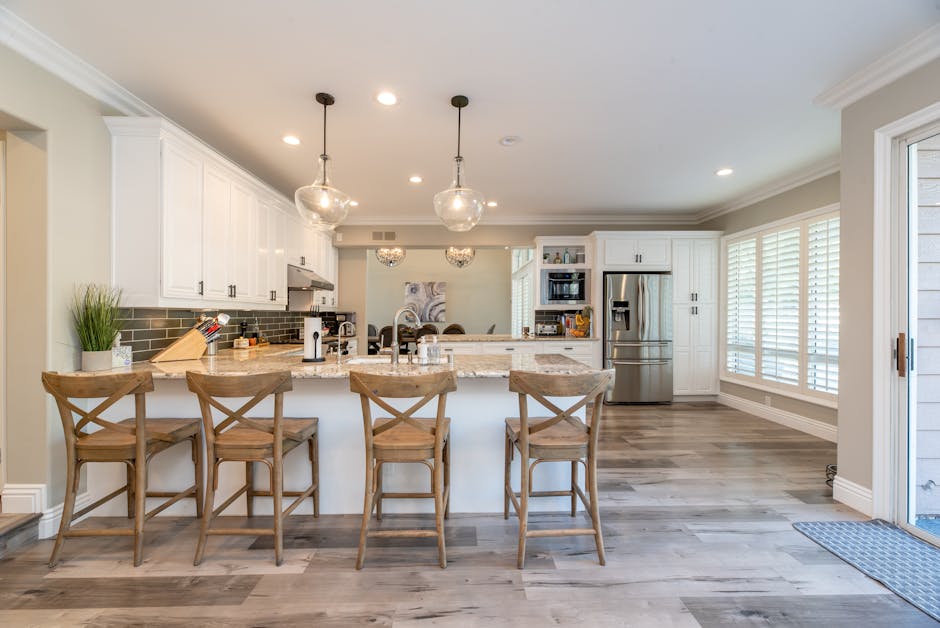
by | Jul 31, 2024 | Uncategorized

What is an ADU?
In the realm of real estate, an ADU stands for Accessory Dwelling Unit. This compact living space on the same grounds as your primary residence opens up a world of possibilities for homeowners. ADUs can be detached structures like a cottage or an attached addition to your existing home, but their purpose remains the same – to offer extra living quarters or functionality on your property.
Commonly known as a granny flat, backyard cottage, or in-law suite, ADUs are versatile and can serve multiple purposes based on your needs. Whether you want to create an independent living space for aging parents, a rental unit for extra income, or a cozy guest house, an ADU can make it all possible.
The beauty of an ADU lies in its flexibility and ability to adapt to various scenarios. It’s like having a mini-home within your property boundaries, adding value and functionality without the need for extensive renovations or major construction projects.
Increased Property Value
One significant advantage of adding an ADU to your property is the potential to increase its overall value. This additional living space, equipped with its amenities, can make your property more attractive to potential buyers in the future.
By investing in an ADU, you are essentially diversifying your property’s potential uses, which can appeal to a broader market. Whether it’s for multigenerational living, rental income, or simply added space, the presence of an ADU can set your property apart from others in the neighborhood.
Moreover, the cost of adding an ADU can often provide a higher return on investment compared to other home improvement projects. It’s a strategic way to add value to your property while enhancing its functionality.
Flexible Living Space
Imagine having a versatile space on your property that can adapt to your changing lifestyle needs – that’s the beauty of an ADU. Whether you need a home office, a guest suite, or a separate living area for family members, an ADU offers the flexibility to accommodate various purposes.
With an ADU, you have the freedom to customize the space according to your preferences. From the layout to the design elements, you can create a personalized oasis that aligns with your lifestyle. It’s like having a blank canvas to bring your vision of a perfect living space to life.
Additionally, the flexibility of an ADU extends to its potential uses over time. What may start as a guest house could later transform into a rental unit or even a private retreat for family members. The versatility of an ADU makes it a valuable addition to any property.
Rental Income Potential
One of the most appealing aspects of owning an ADU is the opportunity to generate rental income. Whether you choose to rent it out on a long-term basis or use it as a vacation rental, an ADU can be a lucrative source of additional revenue.
The demand for rental properties is on the rise, making ADUs a sought-after commodity in many real estate markets. By investing in an ADU, you can tap into this growing demand and benefit from a steady stream of passive income.
Furthermore, the rental income from an ADU can help offset mortgage payments or other expenses related to homeownership. It’s a smart financial move that not only adds value to your property but also provides a reliable source of income in the long run.
Multigenerational Living Benefits
In an era where multigenerational living is becoming increasingly common, ADUs offer a practical solution for families looking to accommodate multiple generations under one roof. Whether it’s aging parents, adult children, or relatives, an ADU provides a sense of independence and privacy while keeping loved ones close.
With an ADU, family members can enjoy their living space while remaining connected to the main household. It promotes intergenerational bonding and support while ensuring that everyone has their private retreat. The harmony between shared spaces and personal quarters fosters a strong sense of family unity.
Moreover, having an ADU on the property allows families to navigate changing life stages with ease. As family dynamics evolve, the flexible living arrangement provided by an ADU can adapt to new needs and circumstances, ensuring everyone’s comfort and well-being.
Enhanced Privacy and Independence
Privacy is a precious commodity in today’s world, and an ADU offers a perfect balance between communal living and personal space. Whether it’s for guests, aging parents, or adult children, having a separate living unit provides a sense of autonomy and independence that traditional living arrangements may lack.
Individuals residing in an ADU can enjoy their privacy while still being part of the larger household. It’s a harmonious blend of togetherness and independence, allowing for quality bonding time without compromising personal space. This balance is vital for maintaining healthy relationships and a peaceful living environment.
Furthermore, the independence offered by an ADU can benefit individuals of all ages. From young adults craving autonomy to seniors wanting to age in place with dignity, an ADU provides a solution that meets diverse needs while fostering a sense of empowerment and self-sufficiency.
Reduced Environmental Impact
As sustainability becomes a top priority for many homeowners, ADUs present an environmentally friendly housing solution. By utilizing existing space on your property to create a separate living unit, you reduce the need for new construction and minimize environmental impact.
ADUs are often designed with energy-efficient features that promote eco-friendly living. From solar panels to rainwater harvesting systems, these sustainable elements not only reduce the carbon footprint of your property but also lower utility costs in the long run. It’s a win-win situation for both the environment and your wallet.
Moreover, ADUs encourage urban infill and promote denser living, which can help combat urban sprawl and preserve green spaces. By creating compact, efficient living spaces, homeowners contribute to a more sustainable future while enjoying the benefits of an eco-conscious lifestyle.

by | Jul 24, 2024 | Uncategorized
Embarking on a commercial construction project can be an exciting but overwhelming endeavor. Understanding the factors influencing the timeline is crucial. Let’s delve into the intricacies of commercial construction timelines.

Factors Affecting Timelines
The timeline of a commercial construction project can vary significantly based on several key factors. The size and scope of the project play a crucial role in determining the overall duration. Larger projects involving complex structures or specialized requirements often take longer to complete due to the intricate planning and execution involved.
Moreover, external factors such as weather conditions can impact construction timelines. Adverse weather, such as heavy rain or snow, can lead to delays in construction activities, affecting the overall project schedule. Contractors must account for such variables when outlining the timeline for a commercial construction project.
Additionally, the availability of materials and labor can influence the duration of a construction project. Delays in the delivery of materials or a shortage of skilled laborers can hinder progress and extend the timeline. Ensuring a steady supply chain and skilled workforce is essential to keeping the project on schedule.
Changes in design or scope during the construction process can also impact timelines. Modifications or additions to the initial plans may require additional time for approval, procurement of materials, and implementation. Clear communication and detailed planning from the outset can help mitigate these delays.
Planning and Permitting Process
The planning and permitting process is a critical phase that significantly influences the overall timeline of a commercial construction project. Before any construction work can commence, thorough planning, including architectural designs, engineering assessments, and permit acquisition, is required.
Securing permits from local authorities can be a time-consuming process, with regulations and requirements varying based on the location and project specifics. Delays in obtaining permits can stall the project before ground is even broken, underscoring the importance of starting this process early.
Collaboration between architects, engineers, contractors, and regulatory bodies is essential during the planning phase to ensure alignment with building codes and zoning regulations. Any discrepancies or issues identified during the permit review can lead to revisions and subsequent delays in the project timeline.
Construction Phases
The construction phase of a commercial project is comprised of various stages, each essential to the project’s overall success. Site preparation marks the beginning, involving clearing, grading, and utilities installation to ready the land for construction.
Foundation and structural work follow, laying the groundwork for the building’s stability and framework. Subsequent phases include exterior construction, interior finishes, and mechanical and electrical installations, each requiring precise coordination and execution.
Quality control and inspections are integrated throughout the construction process to ensure compliance with building codes and project specifications. Close monitoring of each phase and prompt resolution of any issues are vital to maintaining the project schedule and delivering a high-quality final product.
As the project nears completion, final inspections, client walk-throughs, and obtaining occupancy permits become focal points. Attention to detail and adherence to timelines during these closing phases are crucial in handing over the project to the client on schedule.
Navigating Commercial Construction Timelines
Completing a commercial construction project requires time, meticulous planning, and professional expertise. By grasping the nuances of each phase and the factors affecting timelines, you can ensure a successful project completion.

by | Jul 24, 2024 | Uncategorized
Embarking on a remodeling project can be both exciting and daunting. Finding the right remodeling contractor is crucial to ensuring your project’s success. Here, we’ll explore the key factors you should consider when choosing a remodeling contractor.

Credentials
When seeking a remodeling contractor, one of the first things to investigate is their credentials. Make sure they are licensed and insured, as this serves as a form of protection for you and your home. A licensed contractor has met the necessary requirements to operate in their field, showcasing their expertise and commitment to quality workmanship. Insurance, on the other hand, protects you in the event of accidents or damage during the remodeling process.
Additionally, look for certifications or affiliations with professional organizations within the remodeling industry. These credentials indicate that the contractor is dedicated to staying current with industry standards and best practices. By verifying their credentials, you can have confidence in their ability to handle your remodeling project professionally and competently.
As you evaluate a remodeling contractor’s credentials, don’t hesitate to ask for proof of their qualifications. A reputable contractor will be transparent about their credentials and readily provide the necessary documentation for your peace of mind.
Experience
Experience is a crucial aspect to consider when choosing a remodeling contractor. An experienced contractor brings a wealth of knowledge and expertise to your project, having likely encountered various challenges and scenarios in their line of work. Their familiarity with different remodeling techniques and solutions can be invaluable in ensuring a successful outcome for your project.
When discussing your project with a potential contractor, inquire about their past projects and specific experience in handling similar remodels. A seasoned contractor will be able to provide examples of their work, testimonials from satisfied clients, and insights into how they approach different remodeling challenges. This firsthand information can give you a clear picture of what to expect when working with them.
While every contractor starts somewhere, opting for a more experienced professional can reduce the likelihood of delays, mistakes, and unforeseen issues during your remodeling project. Their ability to navigate complexities and deliver high-quality results is often a testament to their years of experience in the field.
In the realm of remodeling, experience truly is a valuable asset that can make a significant difference in the final outcome of your project. By choosing a contractor with a proven track record of successful projects, you can enhance the likelihood of a smooth and satisfying remodeling experience.
Portfolio
A contractor’s portfolio is like a visual resume that showcases their skills, style, and range of capabilities. When evaluating potential remodeling contractors, ask to see their portfolio of past projects. A comprehensive portfolio can provide you with insights into the contractor’s design aesthetics, craftsmanship, and attention to detail.
As you review their portfolio, pay attention to the diversity of their projects. A versatile contractor who has experience with various types of remodels – from kitchen renovations to bathroom upgrades to whole-house transformations – demonstrates their adaptability and proficiency across different styles and scopes of work.
Examining a contractor’s portfolio can also help you envision the possibilities for your own project. Look for projects that resonate with your vision and desired outcomes, as this can indicate that the contractor is aligned with your aesthetic preferences and functional requirements. A strong portfolio reflects a contractor’s creativity, skill, and ability to bring clients’ dreams to life.
References
Checking references is a vital step in the process of selecting a remodeling contractor. Requesting references from previous clients allows you to gain valuable insights into the contractor’s reputation, work ethic, and communication style. A reputable contractor will have a list of satisfied clients who can speak to their professionalism and the quality of their work.
When contacting references, be sure to ask specific questions about their experience working with the contractor. Inquire about the timeliness of the project, the contractor’s responsiveness to questions and concerns, and the overall satisfaction with the completed work. Hearing directly from past clients can provide you with a firsthand account of what it’s like to collaborate with the contractor.
In addition to client references, consider seeking feedback from industry partners or suppliers who have collaborated with the contractor. Their perspectives can offer further insights into the contractor’s reliability, professionalism, and integrity throughout the remodeling process. By gathering multiple references, you can make a well-informed decision about the contractor’s suitability for your project.
Choosing the Ideal Remodeling Contractor
In conclusion, selecting the perfect remodeling contractor is the cornerstone of a successful remodeling project. By ensuring they meet the criteria mentioned above, you can embark on your project with confidence and peace of mind. Remember, a skilled and reliable remodeling contractor can transform your vision into reality.






